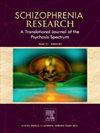女性和非二元性早期精神病患者的生殖健康经历:一项定性研究
IF 3.6
2区 医学
Q1 PSYCHIATRY
引用次数: 0
摘要
背景和假设精神病通常出现在青年期,可影响生殖健康,包括次优生育和意外怀孕的风险。本研究旨在探讨年轻女性和非二元精神病患者的生殖健康经验。在这项定性研究中,加拿大多伦多有早期精神病经历的年轻女性和非二元服务使用者参与了关于其生殖健康经历的半结构化访谈(性健康经历单独分析)。为这一人群提供医疗保健的临床医生也参加了访谈/焦点小组。主题分析用于描述服务使用者的核心主题,然后了解临床医生的观点如何与这些主题相关。对服务用户的访谈(n = 19,年龄在18-31岁;顺性别妇女n = 15,变性妇女n = 2,非二元个体n = 2)产生了两个核心主题:(1)无论精神病如何,都存在复杂的生殖健康需求;(2)精神病确实特别影响生殖健康优先事项和计划。这些被讨论在三个临床内容领域:避孕,月经,和未来怀孕/计划生育。最后一个主题来自临床医生(n = 36):(3)临床医生努力应对临床复杂性,有时他们的优先事项与患者不同(例如,月经仅是服务使用者的优先事项)。结论:本研究提供了对早期精神病女性和非二元个体生殖健康经历的见解,包括与精神病无关的复杂性,以及额外的精神病相关复杂性。该研究还探讨了临床医生的观点,并确定了服务使用者和临床医生观点之间不一致的领域(例如,与月经有关的领域)。研究结果可以帮助制定干预措施,以改善这一人口的生殖健康。本文章由计算机程序翻译,如有差异,请以英文原文为准。
Reproductive health experiences of women and non-binary people with early psychosis: a qualitative study
Background and hypothesis
Psychosis typically emerges in young adulthood and can impact reproductive health, including risk for suboptimal fertility and unplanned pregnancies. This study aimed to explore the reproductive health experiences of young women and non-binary people with psychosis.
Study design
In this qualitative study, young women and non-binary service users with experience of early psychosis in Toronto, Canada participated in semi-structured interviews about their reproductive health experiences (sexual health experiences analyzed separately). Clinicians providing healthcare for this population also participated in interviews/focus groups. Thematic analysis was used to describe core themes among service users, then understand how clinician perspectives related to these.
Study results
Interviews with service users (n = 19, aged 18–31; cisgender women n = 15, transgender women n = 2, non-binary individuals n = 2) yielded two core themes: (1) Complex reproductive health needs exist irrespective of psychosis, and (2) Psychosis does specifically impact reproductive health priorities and plans. These were discussed across three clinical content areas: contraception, menstruation, and future pregnancy/family planning. A final theme emerged from clinicians (n = 36): (3) Clinicians grapple with clinical complexity, and sometimes have different priorities than their patients (e.g., menstruation was a priority for service users only).
Conclusions
This study offers insights into the reproductive health experiences of women and non-binary individuals with early psychosis, including complexity that exists irrespective of psychosis, and additional psychosis-related complexity. The study also explored clinicians' perspectives, and identified areas of discordance between service user and clinician perspectives (e.g., related to menstruation). Findings can help shape interventions to improve this population's reproductive health.
求助全文
通过发布文献求助,成功后即可免费获取论文全文。
去求助
来源期刊

Schizophrenia Research
医学-精神病学
CiteScore
7.50
自引率
8.90%
发文量
429
审稿时长
10.2 weeks
期刊介绍:
As official journal of the Schizophrenia International Research Society (SIRS) Schizophrenia Research is THE journal of choice for international researchers and clinicians to share their work with the global schizophrenia research community. More than 6000 institutes have online or print (or both) access to this journal - the largest specialist journal in the field, with the largest readership!
Schizophrenia Research''s time to first decision is as fast as 6 weeks and its publishing speed is as fast as 4 weeks until online publication (corrected proof/Article in Press) after acceptance and 14 weeks from acceptance until publication in a printed issue.
The journal publishes novel papers that really contribute to understanding the biology and treatment of schizophrenic disorders; Schizophrenia Research brings together biological, clinical and psychological research in order to stimulate the synthesis of findings from all disciplines involved in improving patient outcomes in schizophrenia.
 求助内容:
求助内容: 应助结果提醒方式:
应助结果提醒方式:


